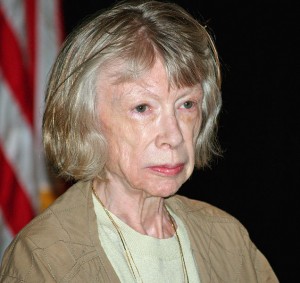This 1978 Paris Review Q&A with Joan Didion had a sad coda when the interviewer Linda Kuehl died soon after the tapes were transcribed. From what I can gather online, Kuehl, who was writing a book about Billie Holiday at the time, committed suicide by jumping from a hotel window. Didion, who’s written so elegantly on the topic of death before and since, filled in for the late interviewer and wrote the opening paragraphs, crediting Kuehl’s intelligence for making her at ease, not something easily done. A few excerpts from the Q&A.
__________
Paris Review: You have said that writing is a hostile act; I have always wanted to ask you why.
Joan Didion: It’s hostile in that you’re trying to make somebody see something that way you see it, trying to impose your idea, your picture. It’s hostile to try to wrench around someone else’s mind that way. Quite often you want to tell somebody your dream, your nightmare. Well, nobody wants to hear about someone else’s dream, good or bad; nobody wants to walk around with it. The writer is always tricking the reader into listening to the dream.
__________
Paris Review: When did you know you wanted to write?
Joan Didion: I wrote stories from the time I was a little girl, but I didn’t want to be a writer. I wanted to be an actress. I didn’t realize then that it’s the same impulse. It’s make-believe. It’s performance. The only difference being that a writer can do it all alone. I was struck a few years ago when a friend of ours–an actress–was having dinner here with us and a couple of other writers. It suddenly occurred to me that she was the only person in the room who couldn’t plan what she was going to do. She had to wait for someone to ask her, which is a strange way to live.
___________
Paris Review: What are the disadvantages, if any, of being a woman writer?
Joan Didion: When I was starting to write–in the late fifties, early sixties–there was a kind of social tradition in which male novelists could operate. Hard drinkers, bad livers. Wives, wars, big fish, Africa, Paris, no second acts. A man who wrote novels had a role in the world, and he could play that role and do whatever he wanted behind it. A woman who wrote novels had no particular role. Women who wrote novels were quite often perceived as invalids. Carson McCullers, Jane Bowles, Flannery O’ Connor, of course. Novels by women tended to be described, even by their publishers, as sensitive. I’m not sure this is true anymore, but it certainly was at the time, and I didn’t much like it. I dealt with it the same way I deal with everything. I just tended my own garden, didn’t pay much attention, behaved–I suppose–deviously. I mean I didn’t actually let too many people know what I was doing.

